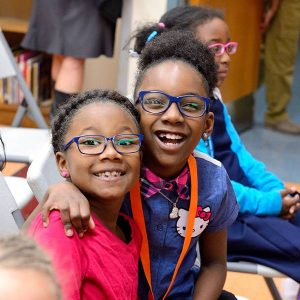Johns Hopkins UniversityEst. 1876
America’s First Research University
Students who received eyeglasses through the school-based Vision for Baltimore program scored higher on reading and math tests, Johns Hopkins researchers from the Wilmer Eye Institute and School of Education found in the largest clinical study of the impact of glasses on education ever conducted in the United States. Students who struggled the most academically before receiving glasses showed the greatest improvement, the researchers found.
The work was funded by the Abell Foundation, Laura and John Arnold Foundation, and Hackerman Foundation.

Vision for Baltimore, which is beginning its sixth year, is operated and funded in partnership with the Johns Hopkins schools of Education and Medicine, Baltimore City Public Schools, the Baltimore City Health Department, eyewear retailer Warby Parker, and national nonprofit Vision To Learn. The Baltimore City Health Department conducts screenings, Vision To Learn performs eye exams, and Warby Parker donates the glasses. In addition to providing more than $1 million in support, Johns Hopkins works closely with the program team to provide technical assistance.
Results of the clinical study, with implications for the millions of children who suffer from vision impairment but lack access to pediatric eye care, were published by JAMA Ophthalmology.
“We rigorously demonstrated that giving kids the glasses they need helps them succeed in school,” says senior author Megan Collins, a pediatric ophthalmologist at the Wilmer Eye Institute, associate faculty at the Johns Hopkins Berman Institute of Bioethics, and co-director of the Johns Hopkins Consortium for School-Based Health Solutions. “The success of the Vision for Baltimore program model and research findings could advance health and educational equity for students across the country.”
In its first five years, Vision for Baltimore tested the vision of more than 64,000 students and distributed more than 8,000 pairs of glasses. The Johns Hopkins study is the most robust work to date evaluating whether receiving glasses through a school-based vision program affects a child’s performance in school.
The three-year randomized clinical trial, conducted from 2016 to 2019, analyzed the performance of 2,304 students in grades 3 to 7 who received screenings, eye examinations, and eyeglasses from Vision for Baltimore. The team looked at their scores on standardized reading and math tests, measuring both 1-year and 2-year impact.

Reading scores increased significantly after one year for students who got glasses, compared to students who got glasses later. There was also significant improvement in math for students in elementary grades.
Researchers found particularly striking improvements for girls, special education students, and students who had been among the lowest performing.
“The glasses offered the biggest benefit to the very kids who needed it the most — the ones who were really struggling in school,” Collins says.
The academic improvements seen after one year were not sustained over two years. Researchers suspect this could be a result of students wearing their glasses less over time, possibly due to losing or breaking them.
To sustain and expand Vision for Baltimore, the partners will continue to seek state support through public insurance programs, as well as local, regional, and national philanthropic support, and hope that other locations nationwide can adopt their own versions of the program.
“Vision To Learn was founded with the mission to make sure no child is without the glasses they need to succeed in school and in life,” says founder Austin Beutner, adding that the organization has provided nearly a quarter of a million children with glasses in more than 500 underserved communities nationwide. “Our efforts depend on caring local partners and we’re grateful for the leadership of Johns Hopkins and the commitment of all our partners in Baltimore.”
Topics: Berman Institute of Bioethics, School of Education, Wilmer Eye Institute, Strengthening Partnerships